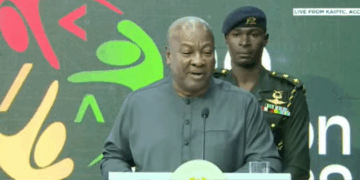Professor Samuel Kaba Akoriyea, the Acting Director General of the Ghana Health Service (GHS), Friday urged regional directors of health services to claim ownership of various projects being implemented by development partners to ensure continuity.
He said such efforts would help to ensure sustainability of the projects and improvement in health care, particularly paying attention to children born with disability.
Prof Akoriyea made the call at a conference organised by the Ministry of Health in Accra to mark the end of the Maternal Newborn and Child Health (MNCH) project while sharing successes and best practices. Best-performing staff were also awarded.
The conference was on the theme: “Reflections of a Decade of Collaboration to Improve Maternal, Newborn and Child Health in Ghana: Sharing progress and lessons learned.”
The 10-year MNCH project, funded by the Korea Foundation for International Healthcare (KOFIH) in the Volta and Oti regions, sought to reduce maternal, newborn and child mortalities in the regions through system strengthening and remodeling of facilities, as well as the provision of health infrastructure and medical equipment.
Prof Akoriyea said the project saw some districts in the Volta and Oti regions recording a significant reduction in maternal and neonatal deaths because of the improved health infrastructure.
Beneficiary districts included Afadzato and Hohoe in the Volta Region and Krachi West and Krachi Nchumuru in the Oti Region.
Dr Hafiz Adam Taher, the Director of Technical Coordination, Ministry of Health, who represented the Minister, said KOFIH’s support remained a priority to the health sector in line with the Government’s goal of ensuring a healthy population for national development.
“The MNCH, under the KOFIH, is yet one of the key projects that has reinforced our collaboration, indeed improving the indicators around the health of our mothers, children, and newborns remains a priority for us all, and we have seen the impact of investment in Ghana from your government towards realising this objective,” he said.
Dr Taher, while expressing the Government’s continued collaboration in improving the health sector, commended the KOFIH and the Korean Government for the support, saying: “We are proud of our relationship and will continue to work closely to benefit our population.”
Dr Robert Adatsi, Deputy Volta Regional Director of Health, said the achievement and successes were significant and had contributed to a reduction of maternal and neonatal deaths in the region.
He said the region had, so far, acquired the appropriate equipment in the right numbers and in the right mix.
The interventions by the KOFIH, which used the bottom-up approach, had also ensured enhanced community participation in service delivery and medical staff accepting postings to those areas, which was not the case previously, Dr Adatsi said.
“With these interventions, our weak and dilapidated equipment and logistics issues have been resolved while the competence of staff has also been improved with capacity building and innovation,” he said.
In addition to the successes, the project has also contributed to over 95 per cent of immunisation coverage for all antigens, ensuring that children were protected from vaccine-preventable diseases in the Oti Region.
Mr Bomin Yang, the Country Director of KOFIH Ghana, said the continued teamwork with the health sector led to the success of the project, representing healthier families and stronger communities.
“Reflecting over a decade of continuous dedication, teamwork, and shared effort, lives have been improved through better health care. Together we have faced challenges, celebrated progress, and seen lives improved through better health care,” he said.
GNA





















































































